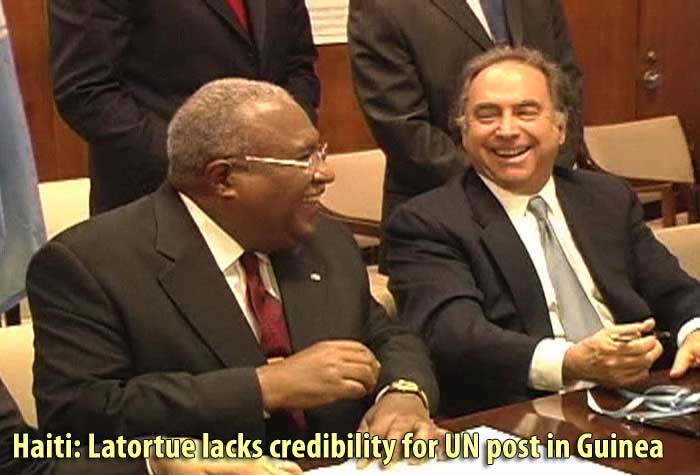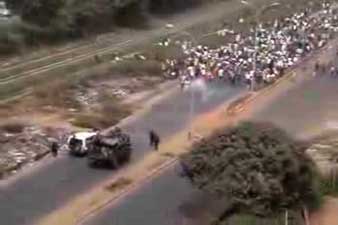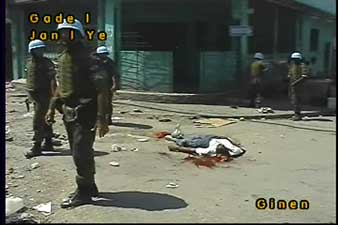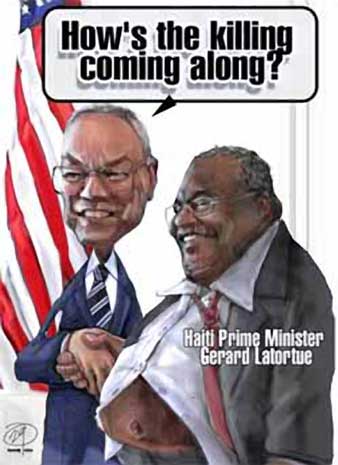|
Former Haiti PM lacks credentials for UN job in Africa
April 3, 2008 |
News
HaitiAction.net |
||||
 |
 |
| Police and military massacre peaceful protesters in Guinea on February 12, 2007. Watch the Radio KanKan video |
 |
| Under the Latortue regime, Haitian police massacred peaceful protesters on February 28, 2005 as the UN stood by and watched. Watch HIP trailer - Read story |
Former Haiti PM lacks credentials for UN job in Africa
On March 20, 2008, the United Nations announced that Gerard Latortue, the former PM of Haiti, was appointed to go to Guinea to conduct a social and political dialogue that will lead ultimately to national elections.
Many in Haiti question the choice of Latortue to broker a settlement in Guinea given his lack of democratic credentials and involvement in mass human rights abuses in Haiti.
Guinea background
In January 2007, in response to deteriorating living standards in Guinea caused by wholesale corruption by officials of the administration of President Lansana Conte, unions called a national strike. Massive numbers of Guineans demonstrated in the streets throughout Guinea and were met with brutal violence by Guinean police and military; on several occasions the police and military opened fire on crowds of unarmed demonstrators. While a final tally is not available, close to 1,000 marchers were killed and hundreds injured according to estimates on the ground.
Through a plan worked out in mediation between the government and the unions, a Prime Minister was appointed in March 2007, to oversee a dialogue by which the concerns of the people of Guinea would be reviewed and an investigation into the state-sponsored violence during the national strike would be pursued.
After a few months, it became apparent that the new Prime Minister of Guinea, Lansana Kouyate had lost the confidence of the people of Guinea and neither their concerns about living conditions nor the violence against the demonstrators would be addressed.
It was Lansana Kouyate who pushed the UN for Haiti’s former PM, Gerard Latortue, to broker a dialogue between so-called sectors of ‘civil society’ that would lead to new elections.
Lack of democratic credentials
There is absolutely nothing to indicate in Latortue’s history that he is qualified to broker an inclusive settlement in Guinea based upon democratic principles. Latortue became Prime Minister of Haiti through an extra-constitutional process where the U.S., France and Canada circumvented the law of the land. They appointed a so-called seven member Council of the Wise who in turn selected Latortue as Prime Minister following the ouster of Jean Bertrand Aristide on February 29, 2004. Nothing in Haiti’s constitution ever allowed for the empowerment of such a body or the process that led to his subsequent appointment. Haiti’s constitution calls for the Prime Minister to be appointed by a duly elected president and ratified by Haiti’s parliament to govern. He was selected to assume the office by virtue of foreign parties outside of the law and contrary the popular democratic choice of the Haitian electorate.
 |
Latortue’s human rights violations
Upon being selected for the office of Prime Minister, Latortue led a regime from 2004-2006 that was responsible for the killing, imprisonment and forced exile of thousands of Haitians. Following the massacre of unarmed demonstrators in Haiti on Sept. 30, 2004, Latortue stated, "We shot them, some of the them fell, others were injured, others ran away." This was merely an introduction and the tip of the iceberg, as thousands of Haitians would ultimately fall prey to false incarceration and death during Latortues’s tenure as Prime Minister of Haiti. U.S. Congresswoman Maxine Waters summed up the history of human rights abuses under Latortue best when she wrote;
“There have been over 1,000 killings in Haiti since Gerard Latortue took office. Lavalas members have been found shot in the head with their hands tied behind their backs. There are reports of Lavalas members being placed in a container and drowned at sea. Many Aristide-supporters are in hiding. Delegations from Amnesty International, the National Lawyers Guild and Let Haiti Live have documented the repression and killing of Lavalas party members.
Gerard Latortue is a shameful Boca Raton buffoon -- incapable of independent leadership. He is but a misguided tool being used to prop up an illegitimate government until the Haitian business elite with the support of Roger Noriega, France and Canada can install their own leaders with a controlled election and a pretense of democracy.”
Latortue’s role in Haiti’s election fiasco
The entire premise of intervention by the international community in Haiti after Aristide’s ouster was designed to justify the overthrow of a democratically elected government. After two years of intense repression against Aristide’s political movement known as Lavalas, U.N.-sponsored elections in Haiti take place at an estimated cost of $76 million. After months of stalling by an election council handpicked by Latortue and the U.N., known as the Conseil Electoral Provisoire (CEP), national elections are held on February 7, 2006.
A latecomer to the campaign and a former Prime Minister and protégé of Aristide, Rene Garcia Preval, enters the race and is clearly the choice of the Haitian people in the elections. Aristide’s Lavalas political movement throws their qualified support behind him to end the repression, free political prisoners and pave the way for the ousted president’s return.
Initial election returns show Preval with a comfortable lead over his opponents who mostly represent the so-called opposition that had supported Aristide’s ouster. Based on exit polls and independent observers, Preval clearly had more than 50% of the popular vote necessary to avoid a runoff and a second round of balloting. Overnight, the U.N./Latortue election council announced that Preval’s tally had fallen to a mere 43%. In response, thousands of Haitians took to the streets and paralyzed the capital of Port au Prince for nearly two weeks. Their determination was intensified in the last week, and the political climate turned incendiary, when thousands of ballots for Preval were discovered uncounted in several dumping sites throughout the capital.
Most Haitians in the streets believed at that moment that the U.N. and the Latortue regime had colluded to keep Preval from assuming office. They formed burning barricades at nearly every major intersection of the capital creating an image that embarrassed the foreign sponsors of the elections.
It was at that moment that a backroom deal was made that would allow the U.N. to save face despite the fact that they had sponsored a $76 million electoral fraud. Like the extra-constitutional Council of the Wise that selected Latortue as Prime Minister, they circumvented the Haitian constitution to determine the validity of blank ballots cast in the election. According to Haitian law these ballots are cast out and not counted in the final tally. The U.N. in collusion with the U.S., France and Canada decide to use the election law of another country to handle the blank ballots. It became known as the “Belgian Option” where instead of being disqualified under Haitian law, the blank ballots would instead be distributed evenly among the presidential candidates. They incredibly applied Belgian electoral law in Haiti to provide Preval with a margin of more than 50% of the vote to assume office. More importantly, it would allow Latortue, the U.N. and the ‘international community’ to save face after sponsoring and delivering a $76 million dollar election fiasco.
 |
 |
 |
Latortue saddles Haitian democracy
February 28, 2005 marked a turning point in Haiti. After many such killings, the U.N. envoy to Haiti Juan Gabriel Valdes, was finally forced to declare that their troops would intervene to stop the Haitian police from shooting unarmed demonstrators demanding the return of ousted president Jean-Bertrand Aristide. The immediate reaction of the Latortue regime was delivered by then Justice Minister Bernard Gousse who stated unequivocally that this impinged on Haitian sovereignty. It should be noted the U.N. backed off and the killing of unarmed demonstrators commenced again unabated.
Before leaving office on Feb. 22, 2006, Latortue was more than willing to sign an agreement with the U.N. effectively leaving the incoming democratically elected administration of Rene Preval with little or no control over the shape and direction of Haitian affairs. The national sovereignty that Latortue claimed to continue killing Aristide supporters was replaced with an accord that virtually gave all control of the Haitian police and judiciary over to the command and control U.N. before Preval was allowed to assume office. Latortue later claimed he didn’t know what he was signing but a video crew documented the entire sordid affair, including his review and signing of the document. The same day he signed the accord with the U.N., Latortue went before a Special Session of the U.N. Security Council chaired by John Bolton, the U.S. representative to the U.N., flanked by Juan Gabriel Valdes and Hédi Annabi. He gave what amounted to an apologia for the elections fiasco and lent credibility to his having signed over any control Preval may have had over Haiti’s government and institutions before assuming the office of the presidency. Haiti would now be under the near virtual control of the U.N. and the ‘international community’, merely leaving Preval with the title of Head of State and little power to institute real change. The president of Haiti effectively became a figurehead for the decision-making of international powerbrokers in his own country. Unfortunately, Preval gracefully accepted the terms but the jury is still out on his prowess for maneuvering the landscape foisted upon him. Much to the angst of the U.N. and the ‘international community’, the real test of the current president’s goals and mettle will be tested in the upcoming presidential elections of 2011. Although he is excluded from running again, he can certainly lend his weight to creating conditions for the ascendancy of a presidential candidate sympathetic to former president Jean-Bertrand Aristide and his Lavalas political movement.
Haiti’s false positive image
The relentless campaign waged by the UN, religious missionary groups and the ‘international community’ to portray Haiti in a positive light has become almost comical. Despite indicators that most Haitians cannot afford to eat they continue to pay for and get positive press that runs contrary to the reality. Most Haitians cannot eat more than one meal a day while unemployment continues to run more than 80%. The UN and other international organizations continue to fail to report on current actual statistics of poverty, malnutrition and life expectancy in Haiti. A large part of which can be directly attributed to the history of Latortue’s tenure as the unelected prime minister of Haiti.
Lessons for Guinea
Many Haitians and their supporters question whether Latortue can be expected to provide any more positive results in negotiations in Guinea, an African country that is not his own. They make it clear his track record in Haiti speaks for itself. Whether it was supporting state-sponsored terror to achieve political objectives or ultimately selling out the sovereignty of his own nation to the Bush administration, he simply cannot be trusted. The U.N. is merely applying a subtle form of cronyism in choosing him as their representative to broker a settlement in Guinea. Latortue is no more qualified to represent democracy or peace than his record affords. It is a legacy of anti-democratic and brutal behavior that should be noted by the people of Guinea as the U.N. imposes him on them as he was once imposed upon the Haitian people.
©2008 Haiti Information Project - All Rights Reserved
The Haiti Information Project (HIP) is a non-profit alternative news service providing coverage and analysis of breaking developments in Haiti.
Winner of the CENSORED 2008 REAL NEWS AWARD for Outstanding Investigative Journalism
See Also:
One protester killed as demonstrations grow in Haiti Apr 4
Lavalas movement in Haiti will not quit Mar 9
Brazilian military’s experience comes full circle in Haiti Feb 20
The transformation of diplomacy or a new Manifest Destiny?
Feb 28
Mud Cookie economics in Haiti Feb10
Haiti's wealthy prosper while the poor decline Jan 29Pentagon's troubling role in Haiti Jan 1